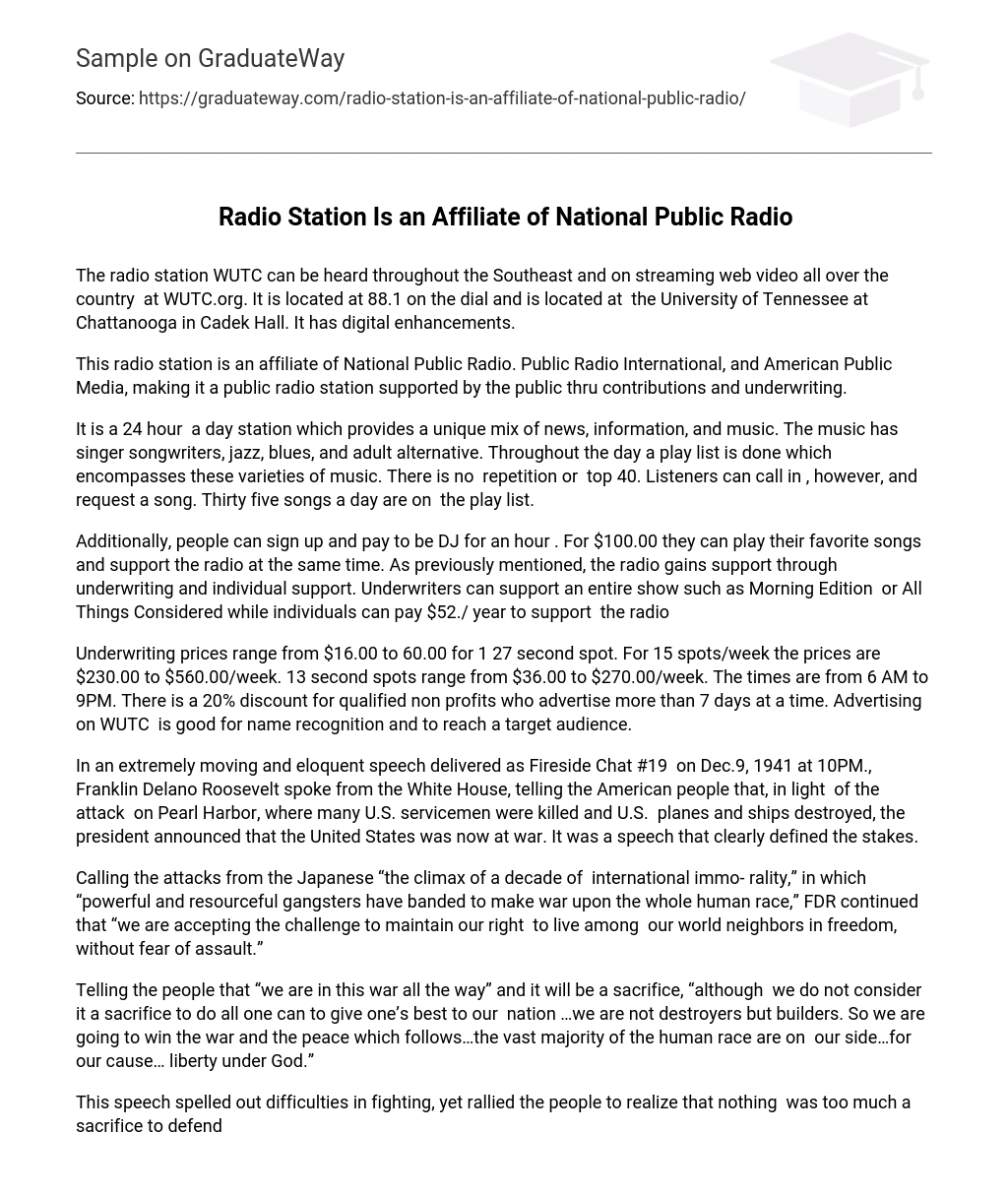The radio station WUTC can be heard throughout the Southeast and on streaming web video all over the country at WUTC.org. It is located at 88.1 on the dial and is located at the University of Tennessee at Chattanooga in Cadek Hall. It has digital enhancements.
This radio station is an affiliate of National Public Radio. Public Radio International, and American Public Media, making it a public radio station supported by the public thru contributions and underwriting.
It is a 24 hour a day station which provides a unique mix of news, information, and music. The music has singer songwriters, jazz, blues, and adult alternative. Throughout the day a play list is done which encompasses these varieties of music. There is no repetition or top 40. Listeners can call in , however, and request a song. Thirty five songs a day are on the play list.
Additionally, people can sign up and pay to be DJ for an hour . For $100.00 they can play their favorite songs and support the radio at the same time. As previously mentioned, the radio gains support through underwriting and individual support. Underwriters can support an entire show such as Morning Edition or All Things Considered while individuals can pay $52./ year to support the radio
Underwriting prices range from $16.00 to 60.00 for 1 27 second spot. For 15 spots/week the prices are $230.00 to $560.00/week. 13 second spots range from $36.00 to $270.00/week. The times are from 6 AM to 9PM. There is a 20% discount for qualified non profits who advertise more than 7 days at a time. Advertising on WUTC is good for name recognition and to reach a target audience.
In an extremely moving and eloquent speech delivered as Fireside Chat #19 on Dec.9, 1941 at 10PM., Franklin Delano Roosevelt spoke from the White House, telling the American people that, in light of the attack on Pearl Harbor, where many U.S. servicemen were killed and U.S. planes and ships destroyed, the president announced that the United States was now at war. It was a speech that clearly defined the stakes.
Calling the attacks from the Japanese “the climax of a decade of international immo- rality,” in which “powerful and resourceful gangsters have banded to make war upon the whole human race,” FDR continued that “we are accepting the challenge to maintain our right to live among our world neighbors in freedom, without fear of assault.”
Telling the people that “we are in this war all the way” and it will be a sacrifice, “although we do not consider it a sacrifice to do all one can to give one’s best to our nation …we are not destroyers but builders. So we are going to win the war and the peace which follows…the vast majority of the human race are on our side…for our cause… liberty under God.”
This speech spelled out difficulties in fighting, yet rallied the people to realize that nothing was too much a sacrifice to defend liberty. It made the stakes extremely clear: Life as the U.S. previously knew it would not continue unless the U.S. f ought the thugs who had attacked us. In the same manner, but not nearly as eloquently, George Bush also told the American people in a speech given 0ct 1, 2001 that their way of life was in jeopardy unless we fought back. He said that “a new generation of Americans were going to learn what sacrifice was”.
He made the case that the U.S. is” an enemy of those who aid terrorists.” and demanded that we must fight the insurgents in Afghanistan: “The Taliban must pay.” However, since the terrorists who commandeered the planes and destroyed so many lives on September 11,2001, were predominantly from Saudi Arabia and were now dead, this war that Bush declared was different from that of WWII. Yet the goal was the same: to defend our liberty and fight for the long haul. To never give in: whatever the cost. As Bush ended his speech he said, “ We will not waver, we will not tire. We will not falter, we will not fail.”
While FDR called the enemy “gangsters,” and Bush talked about “insurgents” and “radical Islamists,” both presidents made clear that there are common enemies which the U.S. must unite against. They also made certain that other nations must decide what side they are on. They both maintained that the U.S. must fight to keep her liberty.
References
- “Fireside Chat #19,” 10 December, 1941. Franklin Delano Roosevelt. 27 September
- 2006. http://www.mhrccrg.
- “0ct.1,2001 Speech,” G.W. Bush. 27 Sptember 2006. http://www.whitehuse.gv.
- “WUTC,” 27 September 2006.http://www.wutc.rg.





